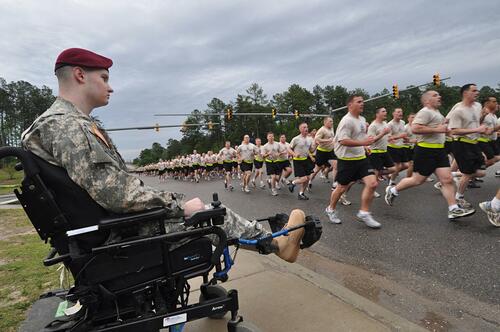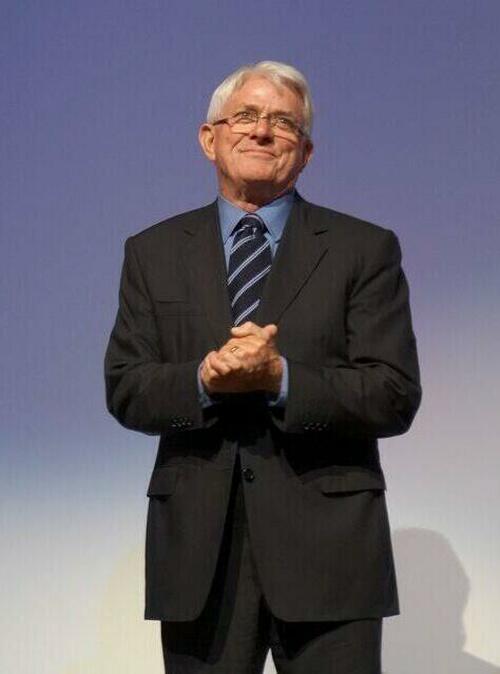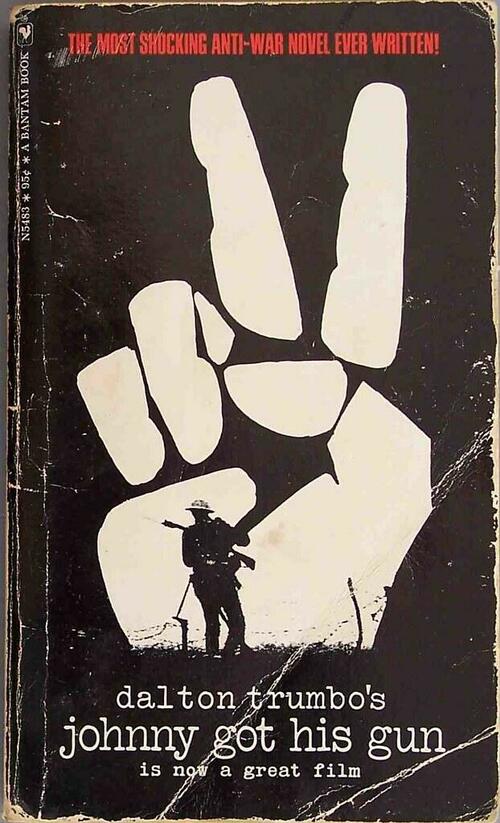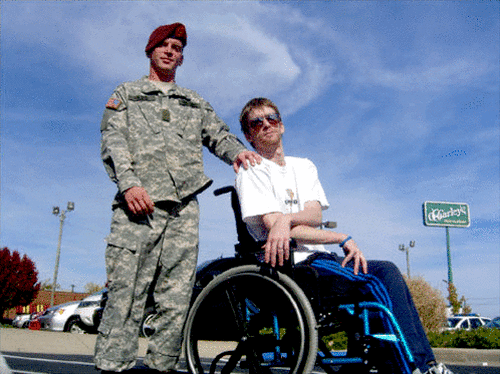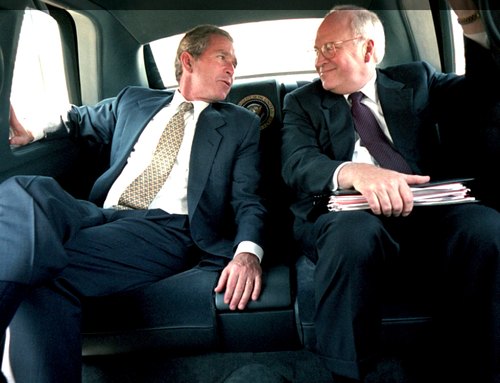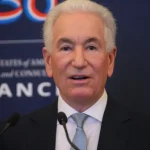
Authored by Chris Hedges via ConsortiumNews.com,
Tomas was crippled for a war that should never have been fought. He was crippled for the lies of politicians. He was crippled for war profiteers. He was crippled for the careers of generals.
Excerpts from the author’s new book, The Greatest Evil is War.
I flew to Kansas City [in 2013] to see Tomas Young. Tomas was paralyzed in Iraq in 2004. He was receiving hospice care at his home. I knew him by reputation and the movie documentary Body of War. He was one of the first veterans to publicly oppose the war in Iraq. He fought as long and as hard as he could against the war that crippled him, until his physical deterioration caught up with him.
“I had been toying with the idea of suicide for a long time because I had become helpless,” he told me in his small house on the Kansas City outskirts where he intended to die.
“I couldn’t dress myself. People have to help me with the most rudimentary of things. I decided I did not want to go through life like that anymore. The pain, the frustration.…”
He stopped abruptly and called his wife. “Claudia, can I get some water?” She opened a bottle of water, took a swig so it would not spill when he sipped, and handed it to him.
“I felt at the end of my rope,” the 33-year-old Army veteran went on. “I made the decision to go on hospice care, to stop feeding and fade away. This way, instead of committing the conventional suicide and I am out of the picture, people have a way to stop by or call and say their goodbyes. I felt this was a fairer way to treat people than to just go out with a note. After the anoxic brain injury in 2008 I lost a lot of dexterity and strength in my upper body. So, I wouldn’t be able to shoot myself or even open the pill bottle to give myself an overdose. The only way I could think of doing it was to have Claudia open the pill bottle for me, but I didn’t want her implicated.”
Tomas Young visits Ground Zero. (Ellen Spiro / Mobilus Media, Wikimedia Commons)
“After you made that decision, how did you feel?” I asked.
“I felt relieved,” he answered. “I finally saw an end to this four-and-a-half-year fight. If I were in the same condition I was in during the filming of Body of War, in a manual chair, able to feed and dress myself and transfer from my bed to the wheelchair, you and I would not be having this discussion. I can’t even watch the movie anymore because it makes me sad to see how I was, compared to how I am.…Viewing the deterioration, I decided it was best to go out now rather than regress more.”
Tomas was crippled for a war that should never have been fought. He was crippled for the lies of politicians. He was crippled for war profiteers. He was crippled for the careers of generals. He bore all this upon his body. And there are hundreds of thousands of other broken bodies like his in Baghdad, Kandahar, Peshawar, the Walter Reed medical center, and hospitals in Russia and Ukraine. Mangled bodies and corpses, broken dreams, unending grief, betrayal, corporate profit, these are the true products of war. Tomas Young was the face of war they do not want you to see.
Sgt. John Hoxie, watches 82nd Airborne Division’s All American Week celebration May 18, 2009. Hoxie returned to Fort Bragg for the first time since he was injured during a 2007 deployment to Iraq. (The U.S. Army/Flickr)
On April 4, 2004, Tomas was crammed into the back of a two-and-a-half-ton Army truck with 20 other soldiers in Sadr City, Iraq. Insurgents opened fire on the truck from above. “It was like shooting ducks in a barrel,” he said. A bullet from an AK-47 severed his spinal column. A second bullet shattered his knee. At first, he did not know he had been shot. He felt woozy. He tried to pick up his M16. He couldn’t lift his rifle from the truck bed. That was when he knew something was terribly wrong.
“I tried to say, ‘I’m going to be paralyzed, someone shoot me right now,’ but there was only a hoarse whisper that came out because my lungs had collapsed,” he said. “I knew the damage. I wanted to be taken out of my misery.”
His squad leader, Staff Sgt. Robert Miltenberger, bent over and told him he would be all right. A few years later Young would see a clip of Miltenberger weeping as he recounted the story of how he had lied to Young.
“I tried to contact him,” said Tomas, whose long red hair and flowing beard make him look like a biblical prophet. “I can’t find him. I want to tell him it is OK.”
Tomas had been in Iraq five days. It was his first deployment. After being wounded, he was sent to an Army hospital in Kuwait, and although his legs, now useless, lay straight in front of him he felt as if he was still sitting cross-legged on the floor of the truck. That sensation lasted for about three weeks. It was an odd and painful initiation into his life as a paraplegic. His body, from then on, would play tricks on him. He was transferred from Kuwait to the U.S. military hospital at Landstuhl, Germany, and then to Walter Reed in Washington, D.C.
He asked if he could meet Ralph Nader. Nader visited him in the hospital with Phil Donahue. Donahue, who had been fired by MSNBC a year earlier for speaking out against the war, would go on, with Ellen Spiro, to make the 2007 film Body of War, an account of Tomas’s daily struggle with his physical and emotional scars.
Ellen Spiro, co-director and co-producer of Body of War, in 2016. (Jessica Jin, CC BY-SA 4.0, Wikimedia Commons)
In the documentary, he suffers dizzy spells that force him to lower his head into his hands. He wears frozen gel inserts in a cooling jacket because he cannot control his body temperature. He struggles to find a solution to his erectile dysfunction. He downs fistfuls of medications — carbamazepine, for nerve pain; coumadin, a blood thinner; tizanidine, an anti-spasm medication; gabapentin, another nerve pain medication; bupropion, an antidepressant; omeprazole, for morning nausea; and morphine. His mother must insert a catheter into his penis. He joins Cindy Sheehan, whose son was killed in Iraq, at Camp Casey in Crawford, Texas, to protest with Iraq Veterans Against the War. His first wife leaves him.
“You know, you see a guy who’s paralyzed, and in a wheelchair, and you think he’s just in a wheelchair,” he says in Body of War. “You don’t think about the, you know, the stuff inside that’s paralyzed. I can’t cough because my stomach muscles are paralyzed, so I can’t work up the full coughing energy. I’m more susceptible to urinary tract infections, and there’s a great big erection sidebar to this whole story.”
Phil Donahue introducing the documentary Body of War at the Toronto International Film Festival, 2007. (jbach, Flickr, CC BY-SA 2.0, Wikimedia Commons)
In early March 2008 a blood clot in his right arm — the arm that bears a color tattoo of a character from Maurice Sendak’s Where the Wild Things Are — caused his arm to swell. He was taken to the Kansas City Veterans Affairs hospital, where he was given the blood thinner coumadin before being released. One month later, the VA took him off coumadin, and soon afterward the clot migrated to one of his lungs. He suffered a massive pulmonary embolism and fell into a coma. When he awoke from the coma in the hospital he could barely speak. He had lost most of his upper-body mobility and short-term memory, and his speech was slurred.
It was then that he began to experience debilitating pain in his abdomen. The hospital would not give him narcotics because the drugs would slow digestion, making it harder for the bowels to function. Tomas could digest only soup and Jell-O. In November, in a desperate bid to halt the pain, he had his colon removed. He was fitted with a colostomy bag. The pain disappeared for a few days and then came roaring back. He could not hold down food, even pureed food, because his stomach opening had shrunk. The doctors dilated his stomach. He could eat only soup and oatmeal. Three weeks earlier his stomach stretched. That was enough.
“I will go off the feeding tube,” he said, “after me and my wife’s anniversary,” April 20, the date on which he married Claudia in 2012. “I was married once before. It didn’t end well. It was a non-amicable divorce. At first, I thought I would wait for my brother and his wife, my niece, and my grandparents to visit me, but the one thing I will miss most in my life is my wife. I want to spend a little more time with her. I want to spend a full year with someone without the problems that plagued my previous marriage. I don’t know how long it will take when I stop eating. If it takes too long, I may take steps to quicken my departure. I have saved a bottle of liquid morphine. I can down that at one time with all my sleeping medication.”
Tomas’s room was painted a midnight blue and had a large cutout of Batman on one wall. He loved the superhero as a child, because “he was a regular person who had a horrible thing happen to him and wanted to save society.”
Tomas joined the Army immediately after 9/11 to go to Afghanistan and hunt down the people behind the attacks. He did not oppose the Afghanistan war. “In fact, if I had been injured in Afghanistan, there would be no Body of War movie to begin with,” he said. But he never understood the call to invade Iraq. “When the Japanese attacked Pearl Harbor, we didn’t invade China just because they looked the same,” he said.
He became increasingly depressed about his impending deployment to Iraq when he was in basic training at Fort Benning, Georgia. He asked the battalion doctor for antidepressants. The doctor said he had to meet first with the unit’s chaplain, who told him, “I think you will be happier when you get over to Iraq and start killing Iraqis.”
“I was dumbstruck by his response,” Tomas said.
U.S. Army recruits undergoing basic training at Fort Benning, Georgia., May 4, 2012. (DoD Photo by Glenn Fawcett)
He had not decided what would be done with his ashes. He flirted with the idea of having them plowed into ground where marijuana would be planted but then wondered if anyone would want to smoke the crop. He knows there will be no clergy at the memorial service held after his death. “It will just be people reminiscing over my life,” he said.
“I spend a lot of time sitting here in my bedroom, watching TV or sleeping,” he said. “I have found — I don’t know if it is the result of my decision or not — it is equally hard to be alone or to be around people. This includes my wife. I am rarely happy. Maybe it is because when I am alone all I have with me are my thoughts, and my mind is a very hazardous place to go. When I am around people I feel as if I have to put on a façade of being the happy little soldier.”
He listened, when he was well enough, to audiobooks with Claudia. Among them have been Al Franken’s satirical book Lies and the Lying Liars Who Tell Them and Michael Moore’s The Official Fahrenheit 9/11 Reader. He was a voracious reader but can no longer turn the pages of a book. He found some solace in the French film The Untouchables, about a paraplegic and his caregiver, and The Sessions, a film based on an essay by the paralyzed poet Mark O’Brien.
Tomas, when he was in a wheelchair, found that many people behaved as if he was mentally disabled, or not even there. When he was being fitted for a tuxedo for a friend’s wedding the salesman turned to his mother and asked her in front of him whether he could wear the company’s shoes.
“I look at the TV through the lens of his eyes and can see he is invisible,” said Claudia, standing in the living room as her husband rested in the bedroom. An array of books on death, the afterlife, and dying is spread out around her. “No one is sick on television. No one is disabled. No one faces death. Dying in America is a very lonely business.”
“If I had known then what I know now,” Tomas said, “I would not have gone into the military. But I was twenty-two, working various menial jobs, waiting tables, working in the copy department of an OfficeMax. My life was going nowhere. September 11 happened. I saw us being attacked. I wanted to respond. I signed up two days later. I wanted to be a combat journalist. I thought the military would help me out of my financial rut. I thought I could use the GI Bill to go to school.”
Tomas was not the first young man to be lured into war and then callously discarded. His story has been told many times. It is the story of Hector in The Iliad. It is the story of Joe Bonham, the protagonist in Dalton Trumbo’s 1939 novel Johnny Got His Gun, whose arms, legs, and face are blown away by an artillery shell, leaving him trapped in the inert remains of his body.
Bonham ruminates in the novel:
“He was the future he was a perfect picture of the future and they were afraid to let anyone see what the future was like. Already they were looking ahead they were figuring the future and somewhere in the future they saw war. To fight that war they would need men and if men saw the future they wouldn’t fight. So they were masking the future they were keeping the future a soft quiet deadly secret. They knew that if all the little people all the little guys saw the future they would begin to ask questions. They would ask questions and they would find answers and they would say to the guys who wanted them to fight they would say you lying thieving sons-of-bitches we won’t fight we won’t be dead we will live we are the world we are the future and we will not let you butcher us no matter what you say no matter what speeches you make no matter what slogans you write.”
For Tomas, the war, the wound, the paralysis, the wheelchair, the anti-war demonstrations, the wife who left him and the one who didn’t, the embolism, the loss of motor control, the slurred speech, the colostomy, the IV line for narcotics implanted in his chest, the open bedsores that expose his bones, the despair — the crushing despair — the decision to die, came down to a girl. Aleksus, his only niece. She would not remember her uncle. But he lay in his dimly lit room, painkillers flowing into his broken body, and thought of her. He did not know exactly when he would die. But it had to be before her second birthday, in June. He did not want to mar that day with his death.
He asked me to help him write a last letter to George W. Bush and the politicians and generals who sent him to war. It was March 2013, on the 10th anniversary of the start of the U.S.-led invasion of Iraq. He could not hold a pen. I took dictation. He planned to kill himself by cutting off his feeding tube. After issuing the letter, which was widely circulated and translated into several languages, Tomas changed his mind about committing suicide. He decided he wanted more time with his wife, Claudia. But he and Claudia knew he did not have long. The couple moved from Kansas City to Portland, Oregon, and then to Seattle, where Tomas died on November 10, 2014, at the age of thirty-four.
Tomas Young and brother. (Ellen Spiro, Wikimedia Commons)
Over the last eight months of Tomas’s life, Veterans Affairs reduced his pain medication, charging he had become an addict. It was a decision that thrust him into a wilderness of agony. Tomas’s existence became a constant battle with the VA. He suffered excruciating “breakthrough pain.” The VA was indifferent. It cut his thirty-day supply of pain medication to seven days. Tomas, when the pills did not arrive on time, might as well have been nailed to a cross. Claudia, in an exchange of several emails with me since Thomas’s death, remembered hearing her husband on the phone one day pleading with a VA doctor and finally saying: “So you mean to tell me it is better for me to live in pain than die on pain medicine in this disabled state?” At night, she said, he would moan and cry out.
“It was a battle of wills,” Claudia told me in an email. “We were losing. Our whole time in Portland was spent dealing with trying to get what we needed to be at home and comfortable and pain free. THAT’S ALL WE WANTED, TO BE HOME AND PAIN FREE, to enjoy whatever time we had left.”
They left Portland for Seattle to be closer to a good spinal cord injury unit. Also, Washington was one of the states that had legalized marijuana, which Tomas used extensively.
“Last week I called because his breakthrough pain started happening throughout the day,” Claudia wrote in an email. “I was using more and more of the morphine and Lorazepam. I was running out of pills. He had a high tolerance for pain, but it was getting bad. I called to report to the doctor that it was getting bad fast. I would not have enough pills to bridge him to the appointment on the 24th. The doctor was unsympathetic. He gave me a condescending lecture about strict narcotics regulations. I said, ‘but my husband is in pain what do I do?’”
Tomas tried to take enough sleeping pills to sleep away the pain. But he was able to rest for a prolonged period only every few days. The pain and exhaustion began to tear apart his frail body. He was dispirited. He was visibly weaker. He felt humiliated.
“Maybe he got so exhausted by the enduring of it all that he took a last sleep and never came back,” Claudia wrote.
“My conclusion is that he died in pain from the exhaustion of having to endure it. Early morning Monday, when I thought he was sleeping, I heard a silence I had never heard before. I couldn’t hear him breathing. I was scared, but I knew. The first thing I did was liberate him from all the tubes and bags on his body. I cut off the feeding tube. I took off the Ostomy Bags. I removed the Foley Catheter. I cleaned his body. I played music. We smoked a last joint together. I smoked for him. I started making calls.”
“The funeral home instructed me to call the police,” she wrote. “They arrived and concluded that there were no issues, but because of his young age they had to refer this to the Medical Examiner. The Medical Examiner came. He made the determination that due to his age that they would have to perform an autopsy. I said, ‘Hey look at his body don’t you think he has been mutilated enough? Are you going to desecrate his body even further?’ So, he was cut open some more.”
The VA called her to ask for the autopsy report.
Tomas’s final days, Claudia said, were often “hopeless and humiliating.”
President George W. Bush and Vice President Dick Cheney, Dec. 27, 2001. (U.S. National Archives)
This is his “Last Letter” to Bush and Cheney:
“I write this letter on the 10th anniversary of the Iraq War on behalf of my fellow Iraq War veterans. I write this letter on behalf of the 4,488 soldiers and Marines who died in Iraq. I write this letter on behalf of the hundreds of thousands of veterans who have been wounded and on behalf of those whose wounds, physical and psychological, have destroyed their lives. I am one of those gravely wounded. I was paralyzed in an insurgent ambush in 2004 in Sadr City. My life is coming to an end. I am living under hospice care. I write this letter on behalf of husbands and wives who have lost spouses, on behalf of children who have lost a parent, on behalf of the fathers and mothers who have lost sons and daughters and behalf of those who care for the many thousands of my fellow veterans who have brain injuries. I write this letter on behalf of those veterans whose trauma and self-revulsion for what they have witnessed, endured, and done in Iraq have led to suicide and on behalf of the active-duty soldiers and Marines who commit, on average, a suicide a day. I write this letter on behalf of the some 1 million Iraqi dead and on behalf of the countless Iraqi wounded. I write this letter on behalf of us all—the human detritus your war has left behind those who will spend their lives in unending pain and grief.
You may evade justice but in our eyes you are each guilty of egregious war crimes, of plunder and, finally, of murder, including the murder of thousands of young Americans—-my fellow veterans—whose future you stole.
I write this letter, my last letter, to you, Mr. Bush, and Mr. Cheney. I write not because I think you grasp the terrible human and moral consequences of your lies, manipulation and thirst for wealth and power. I write this letter because, before my own death, I want to make it clear that I, and hundreds of thousands of my fellow veterans, along with millions of my fellow citizens, along with hundreds of millions more in Iraq and the Middle East, know fully who you are and what you have done. You may evade justice but in our eyes you are each guilty of egregious war crimes, of plunder and, finally, of murder, including the murder of thousands of young Americans—my fellow veterans—whose future you stole.
Your positions of authority, your millions of dollars of personal wealth, your public relations consultants, your privilege, and your power cannot mask the hollowness of your character. You sent us to fight and die in Iraq after you, Mr. Cheney, dodged the draft in Vietnam, and you, Mr. Bush, went AWOL from your National Guard unit. Your cowardice and selfishness were established decades ago. You were not willing to risk yourselves for our nation, but you sent hundreds of thousands of young men and women to be sacrificed in a senseless war with no more thought than it takes to put out the garbage.
I joined the Army two days after the 9/11 attacks. I joined the Army because our country had been attacked. I wanted to strike back at those who had killed some 3,000 of my fellow citizens. I did not join the Army to go to Iraq, a country that had no part in the September 2001 attacks and did not pose a threat to its neighbors, much less to the United States. I did not join the Army to “liberate” Iraqis or to shut down mythical weapons-of- mass-destruction facilities or to implant what you cynically called “democracy” in Baghdad and the Middle East. I did not join the Army to rebuild Iraq, which at the time you told us could be paid for by Iraq’s oil revenues. Instead, this war has cost the United States over $3 trillion. I especially did not join the Army to carry out pre-emptive war. Pre-emptive war is illegal under international law. And as a soldier in Iraq, I was, I now know, abetting your idiocy and your crimes. The Iraq War is the largest strategic blunder in U.S. history. It obliterated the balance of power in the Middle East. It installed a corrupt and brutal pro-Iranian government in Baghdad, one cemented in power through the use of torture, death squads, and terror. And it has left Iran as the dominant force in the region. On every level—moral, strategic, military, and economic—Iraq was a failure. And it was you, Mr. Bush, and Mr. Cheney, who started this war. It is you who should pay the consequences.
I would not be writing this letter if I had been wounded fighting in Afghanistan against those forces that carried out the attacks of 9/11. Had I been wounded there I would still be miserable because of my physical deterioration and imminent death, but I would at least have the comfort of knowing that my injuries were a consequence of my own decision to defend the country I love. I would not have to lie in my bed, my body filled with painkillers, my life ebbing away, and deal with the fact that hundreds of thousands of human beings, including children, including myself, were sacrificed by you for little more than the greed of oil companies, for your alliance with the oil sheiks in Saudi Arabia, and your insane visions of empire.
I have, like many other disabled veterans, suffered from the inadequate and often inept care provided by the Veterans Administration. I have, like many other disabled veterans, come to realize that our mental and physical wounds are of no interest to you, perhaps of no interest to any politician. We were used. We were betrayed. And we have been abandoned. You, Mr. Bush, make much pretense of being a Christian. But isn’t lying a sin? Isn’t murder a sin? Aren’t theft and selfish ambition sins? I am not a Christian. But I believe in the Christian ideal. I believe that what you do to the least of your brothers you finally do to yourself, to your own soul.
My day of reckoning is upon me. Yours will come. I hope you will be put on trial. But mostly I hope, for your sakes, that you find the moral courage to face what you have done to me and to many, many others who deserved to live. I hope that before your time on earth ends, as mine is now ending, you will find the strength of character to stand before the American public and the world, and in particular the Iraqi people, and beg for forgiveness.”
You can order The Greatest Evil is War here.
Authored by Chris Hedges via ConsortiumNews.com,
Tomas was crippled for a war that should never have been fought. He was crippled for the lies of politicians. He was crippled for war profiteers. He was crippled for the careers of generals.
Excerpts from the author’s new book, The Greatest Evil is War.
I flew to Kansas City [in 2013] to see Tomas Young. Tomas was paralyzed in Iraq in 2004. He was receiving hospice care at his home. I knew him by reputation and the movie documentary Body of War. He was one of the first veterans to publicly oppose the war in Iraq. He fought as long and as hard as he could against the war that crippled him, until his physical deterioration caught up with him.
“I had been toying with the idea of suicide for a long time because I had become helpless,” he told me in his small house on the Kansas City outskirts where he intended to die.
“I couldn’t dress myself. People have to help me with the most rudimentary of things. I decided I did not want to go through life like that anymore. The pain, the frustration.…”
He stopped abruptly and called his wife. “Claudia, can I get some water?” She opened a bottle of water, took a swig so it would not spill when he sipped, and handed it to him.
“I felt at the end of my rope,” the 33-year-old Army veteran went on. “I made the decision to go on hospice care, to stop feeding and fade away. This way, instead of committing the conventional suicide and I am out of the picture, people have a way to stop by or call and say their goodbyes. I felt this was a fairer way to treat people than to just go out with a note. After the anoxic brain injury in 2008 I lost a lot of dexterity and strength in my upper body. So, I wouldn’t be able to shoot myself or even open the pill bottle to give myself an overdose. The only way I could think of doing it was to have Claudia open the pill bottle for me, but I didn’t want her implicated.”
Tomas Young visits Ground Zero. (Ellen Spiro / Mobilus Media, Wikimedia Commons)
“After you made that decision, how did you feel?” I asked.
“I felt relieved,” he answered. “I finally saw an end to this four-and-a-half-year fight. If I were in the same condition I was in during the filming of Body of War, in a manual chair, able to feed and dress myself and transfer from my bed to the wheelchair, you and I would not be having this discussion. I can’t even watch the movie anymore because it makes me sad to see how I was, compared to how I am.…Viewing the deterioration, I decided it was best to go out now rather than regress more.”
Tomas was crippled for a war that should never have been fought. He was crippled for the lies of politicians. He was crippled for war profiteers. He was crippled for the careers of generals. He bore all this upon his body. And there are hundreds of thousands of other broken bodies like his in Baghdad, Kandahar, Peshawar, the Walter Reed medical center, and hospitals in Russia and Ukraine. Mangled bodies and corpses, broken dreams, unending grief, betrayal, corporate profit, these are the true products of war. Tomas Young was the face of war they do not want you to see.
Sgt. John Hoxie, watches 82nd Airborne Division’s All American Week celebration May 18, 2009. Hoxie returned to Fort Bragg for the first time since he was injured during a 2007 deployment to Iraq. (The U.S. Army/Flickr)
On April 4, 2004, Tomas was crammed into the back of a two-and-a-half-ton Army truck with 20 other soldiers in Sadr City, Iraq. Insurgents opened fire on the truck from above. “It was like shooting ducks in a barrel,” he said. A bullet from an AK-47 severed his spinal column. A second bullet shattered his knee. At first, he did not know he had been shot. He felt woozy. He tried to pick up his M16. He couldn’t lift his rifle from the truck bed. That was when he knew something was terribly wrong.
“I tried to say, ‘I’m going to be paralyzed, someone shoot me right now,’ but there was only a hoarse whisper that came out because my lungs had collapsed,” he said. “I knew the damage. I wanted to be taken out of my misery.”
His squad leader, Staff Sgt. Robert Miltenberger, bent over and told him he would be all right. A few years later Young would see a clip of Miltenberger weeping as he recounted the story of how he had lied to Young.
“I tried to contact him,” said Tomas, whose long red hair and flowing beard make him look like a biblical prophet. “I can’t find him. I want to tell him it is OK.”
Tomas had been in Iraq five days. It was his first deployment. After being wounded, he was sent to an Army hospital in Kuwait, and although his legs, now useless, lay straight in front of him he felt as if he was still sitting cross-legged on the floor of the truck. That sensation lasted for about three weeks. It was an odd and painful initiation into his life as a paraplegic. His body, from then on, would play tricks on him. He was transferred from Kuwait to the U.S. military hospital at Landstuhl, Germany, and then to Walter Reed in Washington, D.C.
He asked if he could meet Ralph Nader. Nader visited him in the hospital with Phil Donahue. Donahue, who had been fired by MSNBC a year earlier for speaking out against the war, would go on, with Ellen Spiro, to make the 2007 film Body of War, an account of Tomas’s daily struggle with his physical and emotional scars.
Ellen Spiro, co-director and co-producer of Body of War, in 2016. (Jessica Jin, CC BY-SA 4.0, Wikimedia Commons)
In the documentary, he suffers dizzy spells that force him to lower his head into his hands. He wears frozen gel inserts in a cooling jacket because he cannot control his body temperature. He struggles to find a solution to his erectile dysfunction. He downs fistfuls of medications — carbamazepine, for nerve pain; coumadin, a blood thinner; tizanidine, an anti-spasm medication; gabapentin, another nerve pain medication; bupropion, an antidepressant; omeprazole, for morning nausea; and morphine. His mother must insert a catheter into his penis. He joins Cindy Sheehan, whose son was killed in Iraq, at Camp Casey in Crawford, Texas, to protest with Iraq Veterans Against the War. His first wife leaves him.
“You know, you see a guy who’s paralyzed, and in a wheelchair, and you think he’s just in a wheelchair,” he says in Body of War. “You don’t think about the, you know, the stuff inside that’s paralyzed. I can’t cough because my stomach muscles are paralyzed, so I can’t work up the full coughing energy. I’m more susceptible to urinary tract infections, and there’s a great big erection sidebar to this whole story.”
Phil Donahue introducing the documentary Body of War at the Toronto International Film Festival, 2007. (jbach, Flickr, CC BY-SA 2.0, Wikimedia Commons)
In early March 2008 a blood clot in his right arm — the arm that bears a color tattoo of a character from Maurice Sendak’s Where the Wild Things Are — caused his arm to swell. He was taken to the Kansas City Veterans Affairs hospital, where he was given the blood thinner coumadin before being released. One month later, the VA took him off coumadin, and soon afterward the clot migrated to one of his lungs. He suffered a massive pulmonary embolism and fell into a coma. When he awoke from the coma in the hospital he could barely speak. He had lost most of his upper-body mobility and short-term memory, and his speech was slurred.
It was then that he began to experience debilitating pain in his abdomen. The hospital would not give him narcotics because the drugs would slow digestion, making it harder for the bowels to function. Tomas could digest only soup and Jell-O. In November, in a desperate bid to halt the pain, he had his colon removed. He was fitted with a colostomy bag. The pain disappeared for a few days and then came roaring back. He could not hold down food, even pureed food, because his stomach opening had shrunk. The doctors dilated his stomach. He could eat only soup and oatmeal. Three weeks earlier his stomach stretched. That was enough.
“I will go off the feeding tube,” he said, “after me and my wife’s anniversary,” April 20, the date on which he married Claudia in 2012. “I was married once before. It didn’t end well. It was a non-amicable divorce. At first, I thought I would wait for my brother and his wife, my niece, and my grandparents to visit me, but the one thing I will miss most in my life is my wife. I want to spend a little more time with her. I want to spend a full year with someone without the problems that plagued my previous marriage. I don’t know how long it will take when I stop eating. If it takes too long, I may take steps to quicken my departure. I have saved a bottle of liquid morphine. I can down that at one time with all my sleeping medication.”
Tomas’s room was painted a midnight blue and had a large cutout of Batman on one wall. He loved the superhero as a child, because “he was a regular person who had a horrible thing happen to him and wanted to save society.”
Tomas joined the Army immediately after 9/11 to go to Afghanistan and hunt down the people behind the attacks. He did not oppose the Afghanistan war. “In fact, if I had been injured in Afghanistan, there would be no Body of War movie to begin with,” he said. But he never understood the call to invade Iraq. “When the Japanese attacked Pearl Harbor, we didn’t invade China just because they looked the same,” he said.
He became increasingly depressed about his impending deployment to Iraq when he was in basic training at Fort Benning, Georgia. He asked the battalion doctor for antidepressants. The doctor said he had to meet first with the unit’s chaplain, who told him, “I think you will be happier when you get over to Iraq and start killing Iraqis.”
“I was dumbstruck by his response,” Tomas said.
U.S. Army recruits undergoing basic training at Fort Benning, Georgia., May 4, 2012. (DoD Photo by Glenn Fawcett)
He had not decided what would be done with his ashes. He flirted with the idea of having them plowed into ground where marijuana would be planted but then wondered if anyone would want to smoke the crop. He knows there will be no clergy at the memorial service held after his death. “It will just be people reminiscing over my life,” he said.
“I spend a lot of time sitting here in my bedroom, watching TV or sleeping,” he said. “I have found — I don’t know if it is the result of my decision or not — it is equally hard to be alone or to be around people. This includes my wife. I am rarely happy. Maybe it is because when I am alone all I have with me are my thoughts, and my mind is a very hazardous place to go. When I am around people I feel as if I have to put on a façade of being the happy little soldier.”
He listened, when he was well enough, to audiobooks with Claudia. Among them have been Al Franken’s satirical book Lies and the Lying Liars Who Tell Them and Michael Moore’s The Official Fahrenheit 9/11 Reader. He was a voracious reader but can no longer turn the pages of a book. He found some solace in the French film The Untouchables, about a paraplegic and his caregiver, and The Sessions, a film based on an essay by the paralyzed poet Mark O’Brien.
Tomas, when he was in a wheelchair, found that many people behaved as if he was mentally disabled, or not even there. When he was being fitted for a tuxedo for a friend’s wedding the salesman turned to his mother and asked her in front of him whether he could wear the company’s shoes.
“I look at the TV through the lens of his eyes and can see he is invisible,” said Claudia, standing in the living room as her husband rested in the bedroom. An array of books on death, the afterlife, and dying is spread out around her. “No one is sick on television. No one is disabled. No one faces death. Dying in America is a very lonely business.”
“If I had known then what I know now,” Tomas said, “I would not have gone into the military. But I was twenty-two, working various menial jobs, waiting tables, working in the copy department of an OfficeMax. My life was going nowhere. September 11 happened. I saw us being attacked. I wanted to respond. I signed up two days later. I wanted to be a combat journalist. I thought the military would help me out of my financial rut. I thought I could use the GI Bill to go to school.”
Tomas was not the first young man to be lured into war and then callously discarded. His story has been told many times. It is the story of Hector in The Iliad. It is the story of Joe Bonham, the protagonist in Dalton Trumbo’s 1939 novel Johnny Got His Gun, whose arms, legs, and face are blown away by an artillery shell, leaving him trapped in the inert remains of his body.
Bonham ruminates in the novel:
“He was the future he was a perfect picture of the future and they were afraid to let anyone see what the future was like. Already they were looking ahead they were figuring the future and somewhere in the future they saw war. To fight that war they would need men and if men saw the future they wouldn’t fight. So they were masking the future they were keeping the future a soft quiet deadly secret. They knew that if all the little people all the little guys saw the future they would begin to ask questions. They would ask questions and they would find answers and they would say to the guys who wanted them to fight they would say you lying thieving sons-of-bitches we won’t fight we won’t be dead we will live we are the world we are the future and we will not let you butcher us no matter what you say no matter what speeches you make no matter what slogans you write.”
For Tomas, the war, the wound, the paralysis, the wheelchair, the anti-war demonstrations, the wife who left him and the one who didn’t, the embolism, the loss of motor control, the slurred speech, the colostomy, the IV line for narcotics implanted in his chest, the open bedsores that expose his bones, the despair — the crushing despair — the decision to die, came down to a girl. Aleksus, his only niece. She would not remember her uncle. But he lay in his dimly lit room, painkillers flowing into his broken body, and thought of her. He did not know exactly when he would die. But it had to be before her second birthday, in June. He did not want to mar that day with his death.
He asked me to help him write a last letter to George W. Bush and the politicians and generals who sent him to war. It was March 2013, on the 10th anniversary of the start of the U.S.-led invasion of Iraq. He could not hold a pen. I took dictation. He planned to kill himself by cutting off his feeding tube. After issuing the letter, which was widely circulated and translated into several languages, Tomas changed his mind about committing suicide. He decided he wanted more time with his wife, Claudia. But he and Claudia knew he did not have long. The couple moved from Kansas City to Portland, Oregon, and then to Seattle, where Tomas died on November 10, 2014, at the age of thirty-four.
Tomas Young and brother. (Ellen Spiro, Wikimedia Commons)
Over the last eight months of Tomas’s life, Veterans Affairs reduced his pain medication, charging he had become an addict. It was a decision that thrust him into a wilderness of agony. Tomas’s existence became a constant battle with the VA. He suffered excruciating “breakthrough pain.” The VA was indifferent. It cut his thirty-day supply of pain medication to seven days. Tomas, when the pills did not arrive on time, might as well have been nailed to a cross. Claudia, in an exchange of several emails with me since Thomas’s death, remembered hearing her husband on the phone one day pleading with a VA doctor and finally saying: “So you mean to tell me it is better for me to live in pain than die on pain medicine in this disabled state?” At night, she said, he would moan and cry out.
“It was a battle of wills,” Claudia told me in an email. “We were losing. Our whole time in Portland was spent dealing with trying to get what we needed to be at home and comfortable and pain free. THAT’S ALL WE WANTED, TO BE HOME AND PAIN FREE, to enjoy whatever time we had left.”
They left Portland for Seattle to be closer to a good spinal cord injury unit. Also, Washington was one of the states that had legalized marijuana, which Tomas used extensively.
“Last week I called because his breakthrough pain started happening throughout the day,” Claudia wrote in an email. “I was using more and more of the morphine and Lorazepam. I was running out of pills. He had a high tolerance for pain, but it was getting bad. I called to report to the doctor that it was getting bad fast. I would not have enough pills to bridge him to the appointment on the 24th. The doctor was unsympathetic. He gave me a condescending lecture about strict narcotics regulations. I said, ‘but my husband is in pain what do I do?’”
Tomas tried to take enough sleeping pills to sleep away the pain. But he was able to rest for a prolonged period only every few days. The pain and exhaustion began to tear apart his frail body. He was dispirited. He was visibly weaker. He felt humiliated.
“Maybe he got so exhausted by the enduring of it all that he took a last sleep and never came back,” Claudia wrote.
“My conclusion is that he died in pain from the exhaustion of having to endure it. Early morning Monday, when I thought he was sleeping, I heard a silence I had never heard before. I couldn’t hear him breathing. I was scared, but I knew. The first thing I did was liberate him from all the tubes and bags on his body. I cut off the feeding tube. I took off the Ostomy Bags. I removed the Foley Catheter. I cleaned his body. I played music. We smoked a last joint together. I smoked for him. I started making calls.”
“The funeral home instructed me to call the police,” she wrote. “They arrived and concluded that there were no issues, but because of his young age they had to refer this to the Medical Examiner. The Medical Examiner came. He made the determination that due to his age that they would have to perform an autopsy. I said, ‘Hey look at his body don’t you think he has been mutilated enough? Are you going to desecrate his body even further?’ So, he was cut open some more.”
The VA called her to ask for the autopsy report.
Tomas’s final days, Claudia said, were often “hopeless and humiliating.”
President George W. Bush and Vice President Dick Cheney, Dec. 27, 2001. (U.S. National Archives)
This is his “Last Letter” to Bush and Cheney:
“I write this letter on the 10th anniversary of the Iraq War on behalf of my fellow Iraq War veterans. I write this letter on behalf of the 4,488 soldiers and Marines who died in Iraq. I write this letter on behalf of the hundreds of thousands of veterans who have been wounded and on behalf of those whose wounds, physical and psychological, have destroyed their lives. I am one of those gravely wounded. I was paralyzed in an insurgent ambush in 2004 in Sadr City. My life is coming to an end. I am living under hospice care. I write this letter on behalf of husbands and wives who have lost spouses, on behalf of children who have lost a parent, on behalf of the fathers and mothers who have lost sons and daughters and behalf of those who care for the many thousands of my fellow veterans who have brain injuries. I write this letter on behalf of those veterans whose trauma and self-revulsion for what they have witnessed, endured, and done in Iraq have led to suicide and on behalf of the active-duty soldiers and Marines who commit, on average, a suicide a day. I write this letter on behalf of the some 1 million Iraqi dead and on behalf of the countless Iraqi wounded. I write this letter on behalf of us all—the human detritus your war has left behind those who will spend their lives in unending pain and grief.
You may evade justice but in our eyes you are each guilty of egregious war crimes, of plunder and, finally, of murder, including the murder of thousands of young Americans—-my fellow veterans—whose future you stole.
I write this letter, my last letter, to you, Mr. Bush, and Mr. Cheney. I write not because I think you grasp the terrible human and moral consequences of your lies, manipulation and thirst for wealth and power. I write this letter because, before my own death, I want to make it clear that I, and hundreds of thousands of my fellow veterans, along with millions of my fellow citizens, along with hundreds of millions more in Iraq and the Middle East, know fully who you are and what you have done. You may evade justice but in our eyes you are each guilty of egregious war crimes, of plunder and, finally, of murder, including the murder of thousands of young Americans—my fellow veterans—whose future you stole.
Your positions of authority, your millions of dollars of personal wealth, your public relations consultants, your privilege, and your power cannot mask the hollowness of your character. You sent us to fight and die in Iraq after you, Mr. Cheney, dodged the draft in Vietnam, and you, Mr. Bush, went AWOL from your National Guard unit. Your cowardice and selfishness were established decades ago. You were not willing to risk yourselves for our nation, but you sent hundreds of thousands of young men and women to be sacrificed in a senseless war with no more thought than it takes to put out the garbage.
I joined the Army two days after the 9/11 attacks. I joined the Army because our country had been attacked. I wanted to strike back at those who had killed some 3,000 of my fellow citizens. I did not join the Army to go to Iraq, a country that had no part in the September 2001 attacks and did not pose a threat to its neighbors, much less to the United States. I did not join the Army to “liberate” Iraqis or to shut down mythical weapons-of- mass-destruction facilities or to implant what you cynically called “democracy” in Baghdad and the Middle East. I did not join the Army to rebuild Iraq, which at the time you told us could be paid for by Iraq’s oil revenues. Instead, this war has cost the United States over $3 trillion. I especially did not join the Army to carry out pre-emptive war. Pre-emptive war is illegal under international law. And as a soldier in Iraq, I was, I now know, abetting your idiocy and your crimes. The Iraq War is the largest strategic blunder in U.S. history. It obliterated the balance of power in the Middle East. It installed a corrupt and brutal pro-Iranian government in Baghdad, one cemented in power through the use of torture, death squads, and terror. And it has left Iran as the dominant force in the region. On every level—moral, strategic, military, and economic—Iraq was a failure. And it was you, Mr. Bush, and Mr. Cheney, who started this war. It is you who should pay the consequences.
I would not be writing this letter if I had been wounded fighting in Afghanistan against those forces that carried out the attacks of 9/11. Had I been wounded there I would still be miserable because of my physical deterioration and imminent death, but I would at least have the comfort of knowing that my injuries were a consequence of my own decision to defend the country I love. I would not have to lie in my bed, my body filled with painkillers, my life ebbing away, and deal with the fact that hundreds of thousands of human beings, including children, including myself, were sacrificed by you for little more than the greed of oil companies, for your alliance with the oil sheiks in Saudi Arabia, and your insane visions of empire.
I have, like many other disabled veterans, suffered from the inadequate and often inept care provided by the Veterans Administration. I have, like many other disabled veterans, come to realize that our mental and physical wounds are of no interest to you, perhaps of no interest to any politician. We were used. We were betrayed. And we have been abandoned. You, Mr. Bush, make much pretense of being a Christian. But isn’t lying a sin? Isn’t murder a sin? Aren’t theft and selfish ambition sins? I am not a Christian. But I believe in the Christian ideal. I believe that what you do to the least of your brothers you finally do to yourself, to your own soul.
My day of reckoning is upon me. Yours will come. I hope you will be put on trial. But mostly I hope, for your sakes, that you find the moral courage to face what you have done to me and to many, many others who deserved to live. I hope that before your time on earth ends, as mine is now ending, you will find the strength of character to stand before the American public and the world, and in particular the Iraqi people, and beg for forgiveness.”
You can order The Greatest Evil is War here.

